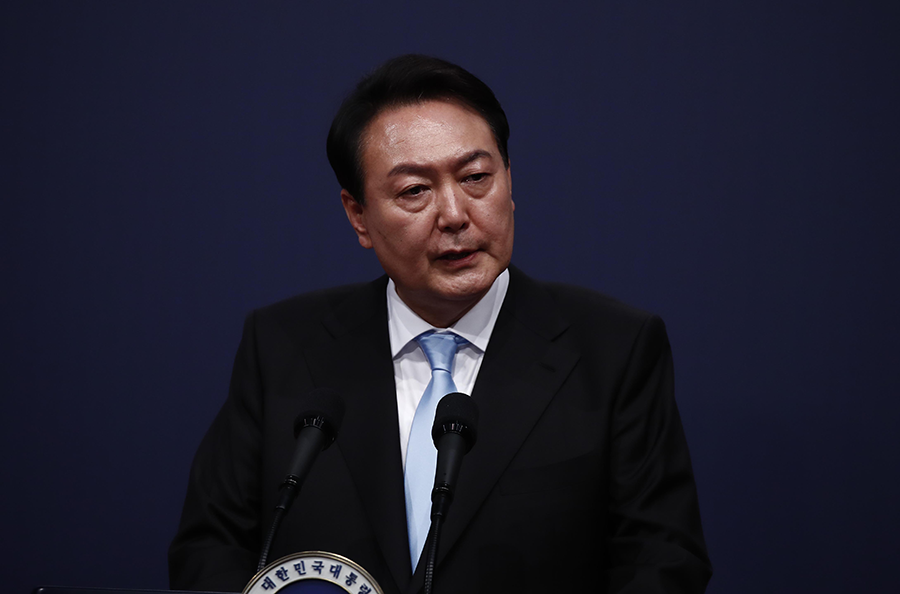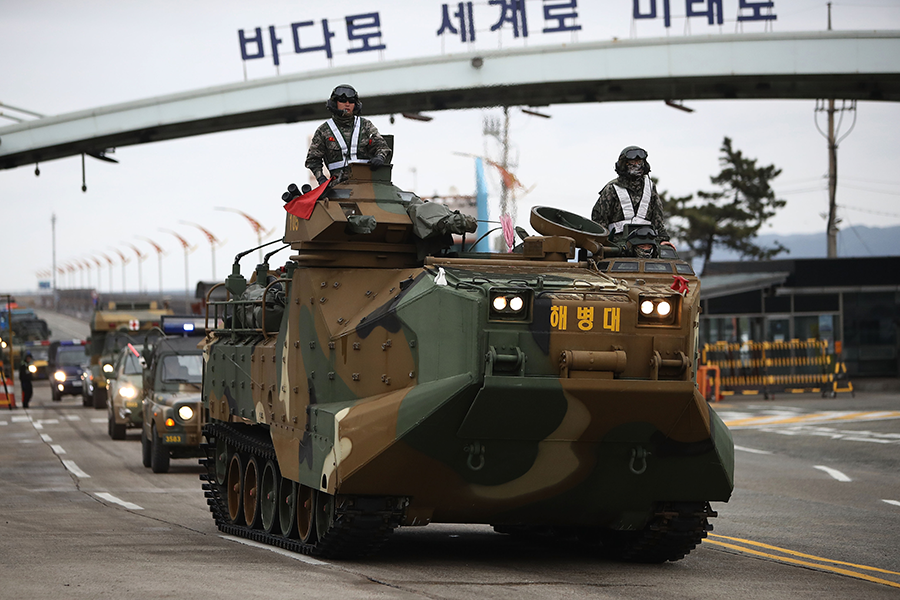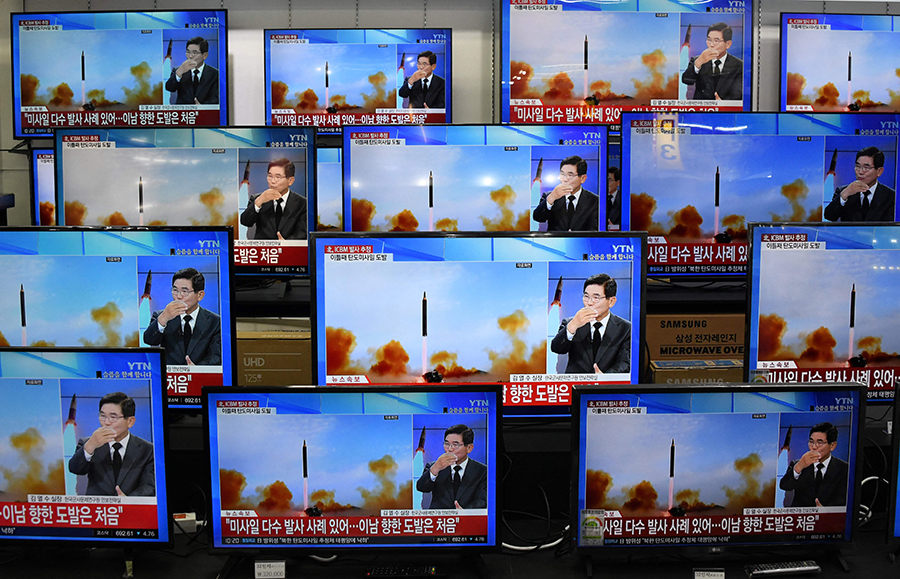"I find hope in the work of long-established groups such as the Arms Control Association...[and] I find hope in younger anti-nuclear activists and the movement around the world to formally ban the bomb."
Reconciling the Korean Peninsula’s Dual Nuclear Proliferation Crises
March 2023
By Frank Aum
North Korea’s codification of its nuclear weapons program last September and its ongoing diplomatic deadlock with the United States have intensified two debates: whether Washington should accept the rogue nation’s nuclear weapons status and whether Seoul should follow suit by producing its own nuclear weapons.
 Some arms control advocates argue that accepting North Korea’s nuclear status would provide more tangible security benefits than the current U.S. policy of pushing for denuclearization. Jeffrey Lewis has asserted that this shift would remove the main impediment to bilateral talks and could help reduce the growing risks of an inadvertent conflict.1 Ankit Panda and Toby Dalton have agreed, noting that although denuclearization may be an “unbridgeable” issue for North Korea, it shares an interest in avoiding nuclear war with the United States.2
Some arms control advocates argue that accepting North Korea’s nuclear status would provide more tangible security benefits than the current U.S. policy of pushing for denuclearization. Jeffrey Lewis has asserted that this shift would remove the main impediment to bilateral talks and could help reduce the growing risks of an inadvertent conflict.1 Ankit Panda and Toby Dalton have agreed, noting that although denuclearization may be an “unbridgeable” issue for North Korea, it shares an interest in avoiding nuclear war with the United States.2
Analysts such as Bruce Klingner, however, have countered that arms control proponents “mischaracterized denuclearization as requiring North Korea to rapidly abandon the entirety of its nuclear and missile programs before receiving any benefits” and failed to explain how accepting North Korea’s nuclear status would “spark any reciprocal diplomatic, security or military response.”3 In addition, it is important to consider that Pyongyang has not explicitly articulated U.S. acceptance of its nuclear status as a precondition for returning to talks, only that Washington drop its “hostile” policy.4
This debate also underscores the paradox of reconciling North Korea’s unstoppable status as a de facto nuclear weapons country with the unmovable U.S. unwillingness to normalize diplomatic and economic relations with a nuclear pariah state. Even if the United States were to accept North Korea’s nuclear status from a planning perspective, that does not mean that Washington would be willing to accord diplomatic ties, remove all economic sanctions imposed on the North, and permit normal trade, which is what Pyongyang really wants.
Threading the needle on these two dilemmas (arms control versus denuclearization and nuclear acceptance versus diplomatic normalization) will require a more flexible stance by all sides, especially the United States, on how the denuclearization goal is framed. Some analysts have suggested that a more realistic U.S. policy would be to deemphasize denuclearization but not jettison it entirely.5 This approach would acknowledge, rather than accept, North Korea’s nuclear program in order to secure the pragmatic constraints that could make disarmament possible in the long run. Indeed, the United States should maintain denuclearization as an “aspirational, long-term, or fig-leaf goal” to ensure the viability of the nonproliferation regime and U.S. political support for an ultimate deal with North Korea.6 Washington must also pursue aggressive engagement with Pyongyang to jump-start the type of talks that can enhance mutual understanding, achieve diplomatic normalcy, and reduce the risks of nuclear war.7
 Whether the United States accepts North Korea’s nuclear status or not, the extreme unlikelihood of North Korea giving up its nuclear deterrent anytime soon means that it will continue to occupy a sui generis category akin to the other three nuclear outliers—India, Israel, and Pakistan. In the case of acceptance, North Korea would be closer in terms of perception, treatment, and status to a country such as Pakistan, whose desire for nuclear recognition and trade is undermined by its record on nonproliferation.
Whether the United States accepts North Korea’s nuclear status or not, the extreme unlikelihood of North Korea giving up its nuclear deterrent anytime soon means that it will continue to occupy a sui generis category akin to the other three nuclear outliers—India, Israel, and Pakistan. In the case of acceptance, North Korea would be closer in terms of perception, treatment, and status to a country such as Pakistan, whose desire for nuclear recognition and trade is undermined by its record on nonproliferation.
Even if North Korea takes steps toward denuclearization, the impossibility of verifying disarmament with certainty would make North Korea a more ambiguous nuclear state like Israel. North Korea would always be in a state of denuclearizing but perhaps never quite getting there, similar to the nuclear-weapon states that committed under Article VI of the nuclear Nonproliferation Treaty to pursue negotiations in good faith toward nuclear disarmament but still have not achieved that goal.
The reality of dealing with a nuclear North Korea for the long term has reinvigorated the nuclear ambitions of its southern neighbor. Last month, South Korean President Yoon Suk Yeol raised the possibility of arming his country with nuclear weapons. It marked the first time that such an idea has been broached publicly by a South Korean leader since the United States withdrew its nuclear weapons from the Korean peninsula in 1991. Although the Yoon government quickly downplayed the statements and stressed that they did not reflect actual policy, the comments do echo a growing sentiment among many South Koreans to take greater control over their country’s national security. A 2022 survey found robust South Korean public support for nuclear weapons, with 71 percent of the respondents favoring the development of indigenous nuclear weapons in South Korea and 56 percent favoring the deployment of U.S. nuclear weapons to South Korea.8 Even when faced with potential repercussions for acquiring nuclear weapons, such as international sanctions, the withdrawal of U.S. troops, or Chinese retaliation, only 11 percent of those who supported the weapons changed their views.
 Some South Korean advocates of nuclear weapons believe that alliance deterrence capabilities and demonstrations of resolve, such as joint military exercises, need to be enhanced to counter the growing threat from North Korea. Some analysts have even suggested that South Korea’s possession of nuclear weapons would ensure a stronger alliance with the United States and prevent decoupling. As Cheong Seong-chang, a senior analyst at the Sejong Institute in South Korea, has argued, “If South Korea possesses nuclear weapons, the United States will not need to ask whether it should use its own weapons to defend its ally, and the alliance will never be put to a test.”9 Other analysts assert, however, that although the U.S. extended deterrence commitment may be strong today, recurring strains of “America First” policies in Washington suggest this promise could be jeopardized in the future.
Some South Korean advocates of nuclear weapons believe that alliance deterrence capabilities and demonstrations of resolve, such as joint military exercises, need to be enhanced to counter the growing threat from North Korea. Some analysts have even suggested that South Korea’s possession of nuclear weapons would ensure a stronger alliance with the United States and prevent decoupling. As Cheong Seong-chang, a senior analyst at the Sejong Institute in South Korea, has argued, “If South Korea possesses nuclear weapons, the United States will not need to ask whether it should use its own weapons to defend its ally, and the alliance will never be put to a test.”9 Other analysts assert, however, that although the U.S. extended deterrence commitment may be strong today, recurring strains of “America First” policies in Washington suggest this promise could be jeopardized in the future.
Researchers have pointed to different rationales for why South Koreans support indigenous nuclear weapons development. The 2022 survey found the main driver of support to be concern about the Chinese threat (55 percent), followed by the prestige derived from being a state possessing nuclear weapons (26 percent). Contrary to the reassurance rationale offered by some South Korean analysts, the study revealed that 61 percent of the respondents who supported nuclear weapons were confident that the United States would meet its extended deterrence commitments.
Analyst Lauren Sukin has suggested, however, that most South Koreans prefer to have their own indigenous nuclear capabilities precisely because they have faith in the willingness of the United States to use nuclear weapons to defend them, albeit in a reckless way.10 Why should South Korea trust the United States to be cautious in nuclear use, she wrote, when the previous U.S. president promised to wreak “fire and fury” on the Korean peninsula? Among South Koreans who hold this view, there is value in their country having its own nuclear weapons because it could better calibrate nuclear tensions on the Korean peninsula with greater restraint.
Nevertheless, Yoon’s provocative statements, while being offhand, still reflect a real desire among some South Korean conservative politicians and analysts to pressure the United States to deliver more concrete security assurances. As a presidential candidate in 2021, Yoon promised to request the redeployment of U.S. tactical nuclear weapons. In 2022, Yoon and U.S. President Joe Biden agreed to expand the scale and scope of joint military exercises and enhance the deployment of U.S. strategic assets to the Korean peninsula. Recently, Yoon mentioned that the two allies were proceeding with nuclear cooperation through joint military planning and exercises, which the Biden administration swiftly clarified would be limited to simulated exercises. Other conservative South Korean analysts have pushed for a NATO-like nuclear-sharing agreement in which South Korean aircraft would be allowed to carry U.S. nuclear weapons during conflict.
One possible reason why Yoon floated the nuclear weapons idea might have been to lay the foundation for an eventual U.S. concession to allow South Korea to develop its own nuclear weapons, if not during his term then during a future conservative administration. There is precedent in South Korea’s five-decade pursuit of greater sovereignty over its ballistic missile capabilities. In 1979, Seoul agreed to U.S.-recommended ballistic missile guidelines that limited development of the weapons to 180 kilometers in range and 500 kilograms in payload. Despite initial concerns about the proliferation of missile technology, the United States, over the years and under considerable South Korean pressure, relented to greater range and payload limits, including 300 kilometers in 2001, 800 kilometers in 2012, an unlimited payload in 2017, and a complete lifting of the guidelines in 2021.
Assenting to South Korean nuclear weapons today may be a bridge too far, but as North Korea’s nuclear status becomes more entrenched and its arsenal grows exponentially, South Korean demands for reassurance will not be sated by status quo U.S. responses.11 After exhausting a range of U.S. deterrence and reassurance options, including declaratory statements about U.S. extended deterrence commitments, enhanced joint military exercises, deployments of U.S. nuclear and strategic assets to the Korean peninsula, senior-level deterrence strategy committees, tailored deterrence strategies, and visits by South Korean officials to U.S. Strategic Command and bomber bases, Washington has little new to offer.
Joint nuclear planning meetings and tabletop exercises may satisfy Seoul for the moment, but there is not much left in the bag except higher-order options such as NATO-like nuclear sharing arrangements, redeployment of U.S. nuclear weapons to South Korea, and acquiescence to South Korea’s own nuclear weapons. A recent report already has recommended that the United States should “lay pre-decisional groundwork for possible redeployment of U.S. low-yield nuclear weapons,” including tabletop planning exercises, environmental impact studies, mapping of storage locations, joint training on nuclear safety and security, and certification of South Korean aircraft for nuclear missions.12
Despite the conventional wisdom that conservative South Korean administrations are better aligned with U.S. security policy, the United States has often had to restrain their aggressive actions, including the push for nuclear weapons, ballistic missile development, and stronger counterprovocation measures against North Korea. It remains to be seen whether South Korea’s simmering desire for nuclear weapons, as in the case of pursuing the lifting of its ballistic missile guidelines, will overcome U.S. objections through attrition. This saga may include warnings about a potential alliance rupture coming from one or both sides. Neither will let this happen, but absent a radical change in the North Korean threat, the alliance defense posture will not remain at the status quo.
ENDNOTES
1. Jeffrey Lewis, “It’s Time to Accept That North Korea Has Nuclear Weapons,” The New York Times, October 13, 2022.
2. Toby Dalton and Ankit Panda, “U.S. Policy Should Reflect Its Own Quiet Acceptance of a Nuclear North Korea,” Carnegie Endowment for International Peace, November 15, 2022, https://carnegieendowment.org/2022/11/15/u.s.-policy-should-reflect-its-own-quiet-acceptance-of-nuclear-north-korea-pub-88399.
3. Bruce Klingner, “This Is Not the Time to Abandon North Korean Denuclearization,” The Hill, October 29, 2022.
4. Frank Aum, “Don’t Isolate North Korea: Why Another Pressure Campaign Would Be a Mistake,” Foreign Affairs, December 22, 2022, https://www.foreignaffairs.com/north-korea/dont-isolate-north-korea.
5. John Carl Baker, “North Korean Arms Control Doesn’t Have to Conflict With Disarmament,” U.S. Institute of Peace, January 19, 2023, https://www.usip.org/publications/2023/01/north-korean-arms-control-doesnt-have-conflict-disarmament.
6. Aum, “Don’t Isolate North Korea.”
7. Frank Aum and George A. Lopez, “A Bold Peace Offensive to Engage North Korea,” War on the Rocks, December 4, 2020, https://warontherocks.com/2020/12/a-bold-peace-offensive-to-engage-north-korea/.
8. Toby Dalton, Karl Friedhoff, and Lami Kim, “Thinking Nuclear: South Korean Attitudes on Nuclear Weapons,” Chicago Council on Global Affairs, February 2022, https://globalaffairs.org/sites/default/files/2022-02/Korea%20Nuclear%20Report%20PDF.pdf.
9. Sang-Hun Choe, “In a First, South Korea Declares Nuclear Weapons a Policy Option,”
The New York Times, January 12, 2023.
10. Lauren Sukin, “The U.S. Has a New Nuclear Proliferation Problem: South Korea,” Bulletin of the Atomic Scientists, January 19, 2023, https://thebulletin.org/2023/01/the-us-has-a-new-nuclear-proliferation-problem-south-korea/.
11. Michelle Ye He Lee, “N. Korea’s Kim Vows ‘Exponential’ Increase in Nuclear Arsenal in New Year,” The Washington Post, January 1, 2023.
12. CSIS Commission on the Korean Peninsula, “Recommendations on North Korea Policy and Extended Deterrence,” January 2023, pp. 18–19, https://csis-website-prod.s3.amazonaws.com/s3fs-public/2023-01/230119_Korean_Commission_2023.pdf.
